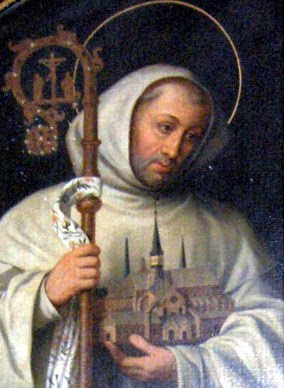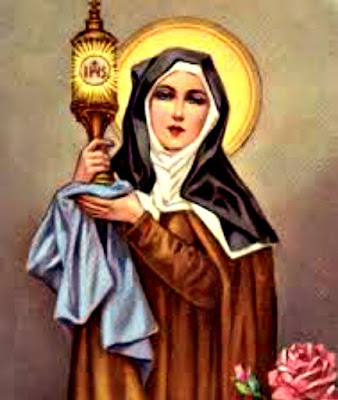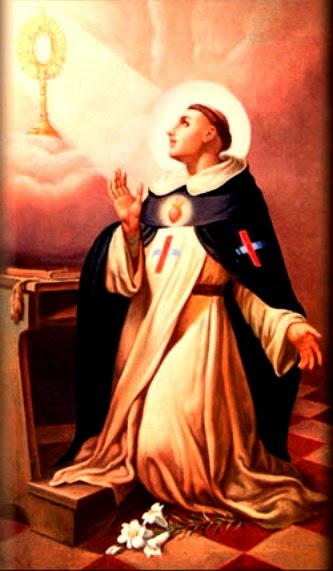St. Bernard of Clairvaux
Today is the memorial of St. Bernard of Clairvaux, abbot and doctor of the Church.
Bernard, the founding abbot of Clairvaux Abbey in Burgundy, was one of the most commanding Church leaders in the first half of the twelfth century as well as one of the greatest spiritual masters of all times and the most powerful propagator of the Cistercian reform. Bernard is also known as the second founder of the Cistercians, the Mellifluous Doctor, and the last of the Fathers of the Holy Church.
He was born to a noble family at Fontaines, near Dijon, France in 1090, the third of seven children.
Bernard left his privileged life near Dijon, France, to join the Cistercians at the age of 22. He was well educated and so passionate about his faith that he convinced 30 of his relatives -- including all of his brothers, his uncle, and later his widowed father -- as well as many friends to join him at the abbey. Bernard first entered the abbey at Citeaux, but only three years later was sent with 12 other monks to establish another monastery in the Diocese of Champagne. The monastery came to be known Clairvaux, the Valley of Light.
As a young abbot he published a series of sermons on the Annunciation. These marked him not only as a most gifted spiritual writer but also as the "cithara of Mary," especially noted for his development of Mary's role as mediator.
Bernard's spiritual writing as well as his extraordinary personal magnetism began to attract many to Clairvaux and the other Cistercian monasteries, leading to many new foundations. He was drawn into the controversy developing between the new monastic movement which he preeminently represented and the established the Cluniac order, a branch of the Benedictines. This led to one of his most controversial and most popular works, his Apologia.
Bernard's dynamism soon reached far beyond monastic circles. He was sought as an advisor and mediator by the ruling powers of his age. More than any other he helped to bring about the healing of the papal schism which arose in 1130 with the election of the antipope Anacletus II. He was commissioned by Pope Eugene III to preach the second Crusade. In obedience to the Sovereign Pontiff he traveled through France and Germany, and aroused the greatest enthusiasm for the holy war among the masses of the population. The failure of the expedition raised a great storm against the saint, but he attributed it to the sins of the Crusaders.
Although he suffered from constant physical pain and illness and had to govern a monastery that soon housed several hundred monks and was sending forth groups regularly to begin new monasteries (he personally saw to the establishment of sixty-five of the three hundred Cistercian monasteries founded during his thirty-eight years as abbot), he yet found time to compose many spiritual works that still speak to us today. He laid out a solid foundation for the spiritual life in his works on grace and free will, humility and love.
His gifts as a theologian were called upon to respond to the dangerous teachings of the scintillating Peter Abelard, of Gilbert de la Porree and of Arnold of Brescia. His masterpiece, his Sermons on the Song of Songs, was begun in 1136 and was still in composition at the time of his death. With great simplicity and poetic grace Bernard writes of the deepest experiences of the mystical life in ways that became normative for all succeeding writers. For Pope Eugene he wrote Five Books on Consideration, the bedside reading of Pope John XXIII and many other pontiffs through the centuries.
Bernard died at Clairvaux on August 20, 1153. He was canonized by Pope Alexander III on January 18, 1174. Pope Pius VII declared him a Doctor of the Church in 1830.
Patron: beekeepers; bees; candlemakers; chandlers; wax-melters; wax refiners; Gibraltar; Queens College, Cambridge.
Some of St. Bernard's writings can be downloaded here.
St. Bernard on the Blessed Virgin Mary:
"In dangers, in doubts, in difficulties, think of Mary, call upon Mary. Let not her name depart from your lips; never suffer it to leave your heart. And that you may more surely obtain the assistance of her prayer; neglect not to walk in her footsteps. With her for guide, you shall never go astray; while invoking her, you shall never lose heart; so long as she is in your mind, you are safe from deception; while she holds your hand, you cannot fall; under her protection you have nothing to fear; if she walks before you, you shall not grow weary; if she shows you favor, you shall reach the goal.”
"If the hurricanes of temptation rise against you, or you are running upon the rocks of trouble, look to the star- call on Mary!"
St. Bernard on Love:
"Love is sufficient of itself; it gives pleasure by itself and because of itself. It is its own merit, its own reward. Love looks for no cause outside itself, no effect beyond itself. Its profit lies in the practice. Of all the movements, sensations and feelings of the soul, love is the only one in which the creature can respond to the Creator and make some sort of similar return however unequal though it be. For when God loves, all he desires is to be loved in return. The sole purpose of his love is to be loved, in the knowledge that those who love him are made happy by their love of him."
Prayer
O God, by whose grace your servant Bernard of Clairvaux, kindled with the flame of your love, became a burning and a shining light in your Church: Grant that we also may be aflame with the spirit of love and discipline, and walk before you as children of light; through Jesus Christ our Lord, who lives and reigns with you, in the unity of the Holy Spirit, one God, now and for ever.





Thank you for such a beautiful piece, Jean. Your waiting is exquisite. : )
ReplyDelete